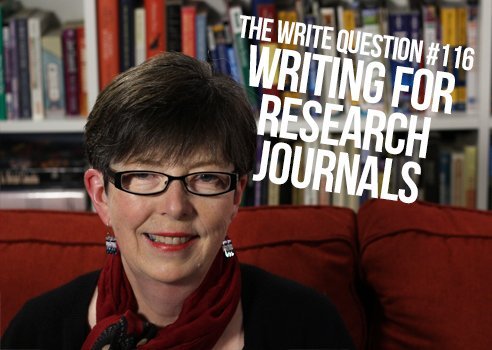Viewing time: 4 mins. 33 secs.
The Write Question is a weekly video podcast about writing that I started in 2017 and that ran, more or less weekly, until April 2022. This is a republication of issue #116, which discusses how to write for research journals. The post first ran on Nov. 15/19.
Transcript:
Do you need to learn how to write for research journals? That’s the topic I’m addressing today in The Write Question. I’m Daphne Gray-Grant, the Publication Coach.
I have a question from Avinash Chalumuri, a PhD student based in Visakhapatnam, India. Here’s what he’s asked via email:
“As part of my doctoral studies, I have to do some experiments and write a scientific paper for research publication. I would like to know of the necessary care/rules/facts to be considered while writing the journal paper so that the reviewers won’t reject it in the first place. Can you give me any advice?”
Thanks for the question, Avinash. When I was young, I was determined to write articles for national magazines. While my audience was very different from the one you’re seeking, the system is more or less the same.
The first step is to make yourself familiar with the demands of each publication you want to target. Don’t look for generic guidelines about how to get published in nameless scientific journals. Instead, get very specific.
You didn’t tell me your area of speciality, but let’s pretend that you’re a chemist. I just did a quick Google search and learned the names of some of the most popular journals for chemistry. The top five appear to be:
- Accounts of Chemical Research
- Angewandt Chemie (German)
- Bulletin of the Chemical Society of Japan
- Canadian Journal of Chemistry
- Chemical Communications
Create a similar list of journals in your own subject area and then spend several weeks reading them. Just reading. Here are some of the questions you should ask yourself:
- What length of article does this journal typically publish?
- What angle or focus do they appear to favour?
- Is there a particular type of article they like?
- Is there any subject — important to your field — that this journal hasn’t addressed recently?
If you tailor your approach to the specific needs and demands of the individual journal, you are far more likely to succeed.
Then, when you feel you’re ready to prepare a submission for that journal, do two more things:
First, make sure they haven’t already published a piece that’s similar to what you’re proposing. No journal wants to be repetitious. If they’ve already done it, take your piece to another publication.
Second, go look for the journal’s submission guidelines and then follow them to the letter. For example, they might specify HOW they want to receive the piece – perhaps in the body of the email, or more likely as an attachment. They might tell you which software the piece should be in. They may also have certain specifications about how they want tables and graphs handled. And they will certainly have some demands relating to ethics.
Even if some of their requirements seem annoying or foolish to you, don’t ignore them. They’re not suggestions. They’re requirements.
Submission guidelines can always be found on the journal’s website. I’m attaching a link to the submission guidelines for the Canadian Journal of Chemistry so you can see an example.
Finally, if you get past step 1, and your article is sent to peer reviewers, you may end up with some negative comments to address. I’ve already done a video on how to deal with that situation. See link below.
Getting your first publication in an academic journal is a big achievement. I suggest you speak with some of your supervisors and fellow students and ask them if they have any other recommendations for you.
Finally, let me wrap up with a quote from business man and motivational speaker Bo Bennett: “A rejection is nothing more than a necessary step in the pursuit of success.”
Avinash, don’t allow yourself to be fearful about the process of getting published. Yes, it’s almost inevitable that you won’t succeed right away. But with time and enough diligence, you will have the pleasure of seeing your own name in an academic journal.


